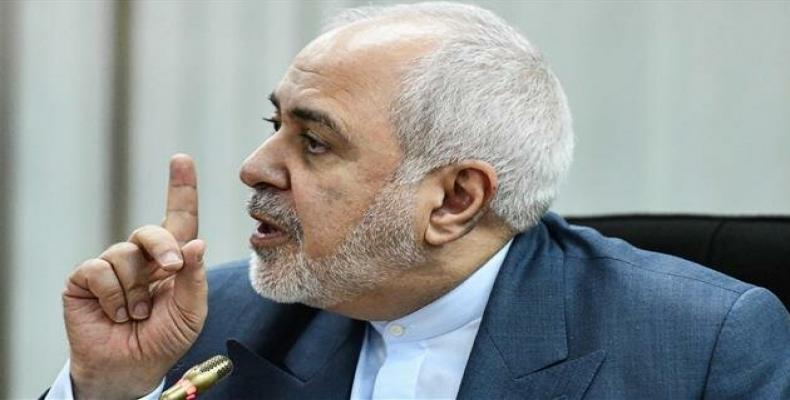Tehran, July 15 (RHC)-- On the anniversary of the 2015 nuclear deal, Foreign Minister Mohammad Javad Zarif of Iran draws attention to the U.S.’s unilateral withdrawal from the accord in defiance of international law, saying Washington’s “contempt for law and diplomacy” poses a security threat both to America itself and the entire world.
Zarif issued the warning in a post on his official Twitter account on Tuesday, concurrent with the fifth anniversary of the Joint Comprehensive Plan of Action (JCPOA), which he described as “last decade’s greatest diplomatic achievement.”
The top Iranian diplomat said the occasion also is a “reminder that U.S. lawless behavior should not be the yardstick by which int’l norms are measured.” Zarif also shared an image showing news headlines reporting Washington’s withdrawal from other international agreements besides the JCPOA and more recently from the World Health Organization.
“U.S. contempt for law & diplomacy places it in global disrepute & threatens global—and US—security,” the Iranian foreign minister said.
The historic Iran deal was reached between Iran and a group of countries then known as the P5+1 — which included the United States, Britain, France, Russia, China, and Germany — on July 14, 2015. However, in May 2018, President Donald Trump unilaterally pulled the U.S. out of the JCPOA and re-imposed the sanctions that had been lifted under the deal.
Verified by the International Atomic Energy Agency (IAEA), Iran remained fully compliant with the JCPOA for an entire year, waiting for the co-signatories to honor their commitments and offset the impacts of the U.S. withdrawal.
But, as the European parties continued to renege on their obligations, the Islamic Republic moved in May 2019 to suspend its JCPOA commitments under articles of the deal covering Tehran’s legal rights in case of non-compliance by the other side. A senior Iranian diplomat says Tehran believes the three European signatories to the JCPOA have not abided by their commitments.
Also marking the anniversary, the Iranian Foreign Ministry said the United States has “repeatedly violated” the JCPOA over the past five years while Europeans have also failed to fulfill their promises.
In a tweet on Tuesday, the ministry added that Iran “remained a faithful party” to the deal for five years. “To #Iran, #DiplomcyMatters, however it will not allow a bully to undermine Iran’s interests by intimidating the int’l community,” it pointed out.
In a statement, Russia's Ministry of Foreign Affairs said the implementation of the JCPOA constantly requires enormous endurance and perseverance from its participants. It added that Washington’s unilateral abandoning of its obligations and numerous gross violations of the United Nations Security Council Resolution 2231, which endorses the JCPOA, are the root cause of the many difficulties and challenges facing the process of implementing the agreements.
“We urge our JCPOA partners and other UN members to show political will and defend it. The UN member states have no room for error today,” the statement said.
It slammed as “short-sighted and erroneous” the US so-called maximum pressure policy against not only Iran but the JCPOA, saying, “This policy discredits the United States and opposes it to the rest of the world, which is strongly advocating rigorous implementation of the Security Council resolutions and consistent and comprehensive implementation of the JCPOA in accordance with the initially agreed-upon goals and parameters.”
The Russian ministry urged the current White House administration to realize that the United States has and will always have obligations to the rest of the world, which it must fulfill.
“These are the principles of coexistence in a world based on universally recognized norms of international law, rather than the rules that someone is trying to write and rewrite to suit their own needs to the detriment of others,” it said.
The statement further warned that the JCPOA detractors' agenda is merely focused on the deal's destruction and said, "For the sake of their own ambitions and a false sense of exceptionalism, they are prepared to act recklessly, break agreements, escalate military-political tension in the Middle East, provoke a crisis at the UN Security Council and to try to achieve their election goals while doing so."
However, it emphasized that such a path would lead nowhere as the JCPOA was designed to prevent the implementation of military scenarios and to avert the threat of war.


